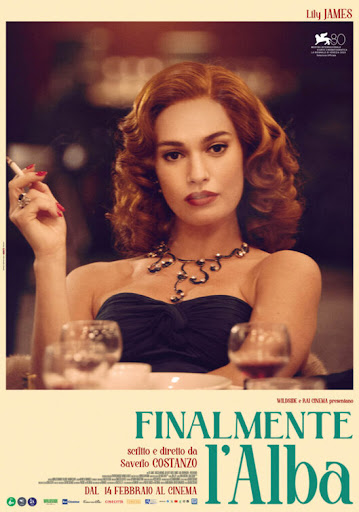In ‘Finalmente l’Alba’ the Magic of Cinecittà
TORONTO – Opening night at ICFF screened Saverio Costanzo’s period drama “Finalmente l’Alba” – one of seven Italian films that competed at the 80th Annual Venice Film Festival. Its trademark Italian nostalgia and tragedian romance was perfectly enveloped by the Distillery’s historical aesthetic. Hundreds of overhanging lights twinkled like stars over the Distillery’s main square, emitting a soft ambient glow – perfect for the evening’s overcast.
To boot, the Festival’s organizers injected a little whimsy into the experience by hiring photographers dressed as 1950s Paparazzi, humorously mobbing moviegoers as they moseyed throughout the heritage site. Festival attendees strolled through the cobble-stoned alleyways greeted by Fellini-inspired street performers, and the lingering aroma of Italy’s sweet and savoury foods. A movie in the piazza, complete with popcorn served in Barilla containers, and the aroma of melted chocolate was the perfect way to settle into opening night.
Beyond the Festival’s atmosphere, it was the movie that shone brightest. Costanzo’s “Finalmente l’Alba” delivers an honest and sometimes uncomfortable depiction of a young woman’s coming of age. The story follows starry-eyed Mimosa (Rebecca Antonaci), who accompanies her sister to a film audition at Cinecitta’s studios. By a stroke of good fortune or fate, and perhaps they’re the same thing, she’s unexpectedly chosen to replace an extra on set. But Mimosa’s true odyssey begins after the day’s shoot, when she’s picked up by the film’s diva, Josephine Esperanza (Lily James), and taken on an unforgettable night – fraught with an unhealthy portion of Hollywood horseplay and excess. Mimosa’s naiveté and language barrier make her a ripe target for the industry’s wolves, as she tries to evade the haughty and hedonistic rabbit holes, which spring up like weeds at every turn. What would normally be alluring for a fledgling young actor inevitably turns repugnant as the Hollywood beast shows her its sinister underbelly.
Early reviews of the film were mixed, with some critics calling the script “didactic”, or Mimosa’s character “uncompelling”. But in an age where movie critics are increasingly pressured to promote the ideologies of the day at the expense of an honest review, audiences are being discouraged from watching excellent films like “Finalmente L’Alba”. But why? Is it because it reflects an industry as it was in the 50s, blemishes and all, with female characters that aren’t written as a mouthpiece for someone’s politics? Possibly.
Is it an imperfect film? Some might say so. But imperfection does not make a film unwatchable and in the case of Costanzo’s latest, I’d consider it a must-watch. Antonaci’s (in the pic above) performance is beautifully controlled and at times brilliant, never betraying the era nor overplaying it. For those who struggle with the mores of the past, the film’s ending artfully suggests that a change is in the air – or as Costanzo puts it, “I imagine that the end of the film is today”. That may be so, but for two hours and twenty minutes, “Finalmente l’Alba” transports us into an era of Hollywood [on the Tiber] that was both awe-inspiring and at odds with itself, filled with every kind of human contradiction that like it or not, remains today. Some of us just call it: the human experience.
Massimo Volpe is a filmmaker and freelance writer from Toronto: he writes reviews of Italian films/content on Netflix






